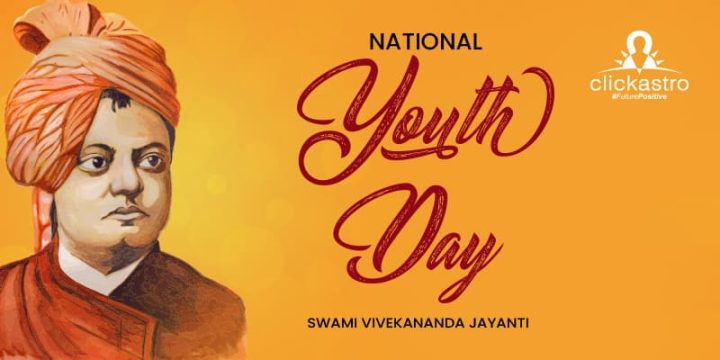Contents[hide]
Introduction
Swami Vivekananda, born on January 12, 1863, in Kolkata, stands as a luminary in the annals of spiritual and philosophical history. A profound philosopher and influential spiritual leader, he wielded significant influence in the revitalization of Hinduism and the dissemination of Vedanta and Yoga to the Western world. Commemorated annually as National Youth Day in India, his birthdate carries not just historical but also astrological significance. A deeper exploration of Swami Vivekananda’s birth chart reveals a celestial layout that shaped his fearless pursuit of spiritual and national goals. His Sagittarius ascendant, Vargottama Kundli, and planetary alignments provided a foundation for his unwavering confidence and multifaceted talents. Beyond the astrological lens, National Youth Day serves as a contemporary celebration, recognizing the dynamic energy and potential of the youth in shaping India’s future, echoing Vivekananda’s ideals of personal growth, spiritual development, and contributing to humanity’s welfare.
A deeper exploration of Swami Vivekananda’s birth chart reveals a celestial layout that shaped his fearless pursuit of spiritual and national goals. His Sagittarius ascendant, Vargottama Kundli, and planetary alignments provided a foundation for his unwavering confidence and multifaceted talents. Beyond the astrological lens, National Youth Day serves as a contemporary celebration, recognizing the dynamic energy and potential of the youth in shaping India’s future, echoing Vivekananda’s ideals of personal growth, spiritual development, and contributing to humanity’s welfare.
Astrological Insights
Sagittarius Ascendant and Vargottama Kundli
Swami Vivekananda’s astrological configuration unveils a Sagittarius ascendant, an integral facet that shaped his character and life’s trajectory. This placement infuses individuals with a deep sense of exploration, philosophy, and a quest for higher knowledge. Additionally, Vivekananda’s possession of a Vargottama Kundli, where the Sun aligns in the same sign in both Navamsa and Lagna Kundli, accentuates the potency of his chart. This rare and powerful alignment signifies a pure soul, endowing him with exceptional self-confidence. This confidence manifested early in his life, evident in his unwavering pursuit of spiritual and national objectives. Swami Vivekananda’s Sagittarius ascendant, coupled with the harmonious alignment in his Kundli, not only influenced his spiritual journey but also contributed to his impactful role as a key figure in the revival of Hinduism and the dissemination of Vedanta and Yoga to the Western world.Moon and Saturn in the Tenth House
In the celestial arrangement of Swami Vivekananda’s birth chart, the Moon and Saturn converge in the tenth house, a configuration that exerts profound influence on his spiritual journey. The tenth house, known as the Karma house, houses Saturn, symbolizing discipline, responsibility, and success in one’s chosen path. This planetary alignment is indicative of Swami Vivekananda’s remarkable success in the spiritual realm.
The Moon, representing emotions and intuition, blends with Saturn’s disciplined energy, bestowing upon him a deep sense of skepticism and a meticulous approach to understanding profound matters. This combination notably manifested in his early reluctance to accept his guru Ramakrishna Paramhansa’s teachings without thorough comprehension. Swami Vivekananda’s journey, shaped by the potent influence of the Moon and Saturn in the tenth house, exemplifies the intricate interplay of celestial forces that guided his spiritual evolution and intellectual discernment.
Jupiter and Mars in the Fifth and Eleventh Houses
Swami Vivekananda’s astrological blueprint reveals a compelling conjunction of Jupiter and Mars, strategically positioned in the eleventh and fifth houses, respectively. Jupiter, the benevolent planet associated with wisdom and spirituality, graces the eleventh house, foretelling success in knowledge and spiritual pursuits. This alignment accentuates
Vivekananda’s profound impact in disseminating spiritual teachings globally. Simultaneously, Mars, the planet of energy and determination, inhabits the fifth house, the realm of education and creativity.
This cosmic arrangement aligns with Swami Vivekananda’s diverse talents, manifesting not only in his spiritual endeavors but also in the arena of education and sports. His dynamic engagement in these varied domains can be attributed to the harmonious interplay of Jupiter and Mars, propelling him to transcend traditional boundaries and leave an indelible mark in both intellectual and physical pursuits. The celestial choreography of Jupiter and Mars in his birth chart serves as a celestial compass, guiding him toward a life that seamlessly blended spiritual enlightenment, educational excellence, and athletic prowess.
Venus and Mercury in the Second House
In the celestial orchestration of Swami Vivekananda’s birth chart, the second house is adorned with the harmonious presence of Venus and Mercury, forming an auspicious cosmic alliance. This planetary conjunction, considered propitious for speech and communication, bestowed upon Swami ji a remarkable gift of eloquence and articulation. Venus, associated with beauty and art, synergizes with Mercury, the planet of intellect and communication, creating a celestial synergy that shaped his compelling oratory. This alignment not only facilitated clear and logical expression but also imbued his speeches with profound wisdom. Swami Vivekananda’s ability to captivate audiences globally, gain recognition, and disseminate spiritual teachings can be traced back to this auspicious amalgamation in the second house. The cosmic dance of Venus and Mercury, harmoniously positioned, became the celestial foundation for Swami Vivekananda’s influential voice, echoing across continents and leaving an enduring legacy in the realm of spirituality and philosophy. Rahu and Ketu Placement
Rahu and Ketu Placement
In the celestial narrative of Swami Vivekananda’s horoscope, the positioning of Rahu in the twelfth house and Ketu in the sixth house unveils a cosmic story of transcendence and enlightenment. Rahu, associated with desires and worldly attachments, resides in the twelfth house, symbolizing the unconscious mind and spiritual exploration. This placement suggests that overcoming ignorance requires a deep connection with the unconscious realms.Ketu, on the other hand, positioned in the sixth house, aligns with the themes of overcoming obstacles and challenges. Swami Vivekananda’s journey to enlightenment harmonizes with these celestial placements, emphasizing the need for guidance from a Guru and the transformative power of yoga. The positive effects of Rahu and Ketu in his horoscope mirror his ability to transcend material limitations, conquer obstacles, and ultimately attain spiritual enlightenment, embodying the profound teachings he later shared with the world.








